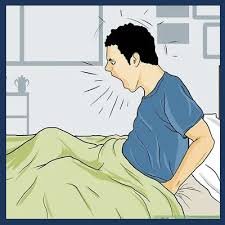Nightfall, also known as nocturnal emission, is a natural biological process that often occurs during adolescence but can happen throughout a man’s life. Despite being a common occurrence, nightfall is surrounded by misconceptions and myths that can lead to unnecessary anxiety or confusion. In this article, we will explore the myths and facts surrounding nightfall, clarifying its causes, frequency, and health implications, and providing a clearer understanding of this natural phenomenon.
What is Nightfall?
Nightfall, medically referred to as nocturnal emission, occurs when semen is involuntarily released from the body during sleep. This typically happens during Rapid Eye Movement (REM) sleep, which is associated with vivid dreams. It is most common in males during puberty but can occur at any age. Nightfall usually results from sexual arousal experienced in dreams or as a natural way for the body to relieve itself of excess semen.
Myth 1: Nightfall Only Happens to Teenagers
Many believe that nightfall only happens during adolescence, as it is primarily linked to puberty and sexual development. This misconception can lead to confusion or concern for adults who experience nocturnal emissions.
Fact: Nightfall Can Happen at Any Age
Although nightfall is more common during puberty due to hormonal changes and increased sexual activity, it can happen at any stage of life. Testosterone levels, sexual abstinence, and stress are factors that may cause nightfall to continue in adulthood. While the frequency of nocturnal emissions often decreases as men age, adult males may still experience them occasionally. It is a natural part of male biology and not limited to a specific age group.
Myth 2: Nightfall is Unhealthy or a Sign of Weakness
Some cultures perpetuate the idea that nightfall is a sign of poor health, weakness, or a sexual disorder. This myth can cause undue stress, making individuals believe they need treatment or medication to stop nightfall.
Fact: Nightfall is a Normal and Healthy Process
Nightfall is a completely normal and healthy process. The male reproductive system produces millions of sperm every day, and the body naturally needs to expel excess sperm. If it isn’t released through ejaculation during sexual activity or masturbation, the body may do so during sleep. Nightfall is one way the body regulates its reproductive system, and it does not indicate weakness or illness. There is no need for medical intervention unless other symptoms accompany nocturnal emissions, such as pain or discomfort.
Myth 3: Excessive Nightfall Can Lead to Infertility
A common misconception is that frequent nightfall reduces sperm count and causes infertility. Some believe that losing semen through nightfall depletes the body’s resources and can hinder a man’s ability to father children.
Fact: Nightfall Does Not Affect Fertility
Nightfall has no adverse effect on fertility. The body continuously produces sperm, and nocturnal emissions do not significantly reduce sperm count. In fact, releasing sperm through nightfall helps maintain reproductive health. The male body is designed to produce and replenish sperm regularly, so there is no danger of “running out” or becoming infertile due to frequent nightfall.
Myth 4: Nightfall Can Be Controlled with Medication
There are numerous products on the market that claim to “cure” or “control” nightfall, often marketed as necessary solutions for men who experience frequent nocturnal emissions. This has led many to believe that nightfall is a condition that requires medical treatment.
Fact: Nightfall Does Not Require Treatment
Nightfall is not a medical condition but a natural process. Therefore, no treatment is needed. Using medications or supplements to “cure” nightfall is unnecessary and could even cause harm due to potential side effects. Instead of attempting to control nightfall, it’s important to understand that it is simply the body’s way of functioning normally. If someone is concerned about the frequency or experiences discomfort, it’s best to consult a healthcare professional rather than rely on unverified products.
Myth 5: Nightfall Can Deplete Vital Energy
In some traditional cultures, nightfall is believed to drain vital energy or life force from the body, causing fatigue, weakness, and even hair loss. This myth often leads to guilt or shame about nocturnal emissions.
Fact: Nightfall Does Not Drain Energy
Scientifically, there is no evidence that nightfall depletes energy or weakens the body. Sperm production is an ongoing process, and the body constantly regenerates sperm. Nightfall is simply a natural outlet for excess sperm and does not affect a person’s overall energy levels, strength, or health. The belief that it causes weakness or health deterioration is purely based on misconceptions and lacks any scientific backing.
Myth 6: Nightfall Happens Only Because of Sexual Thoughts
Many individuals think that nightfall only occurs due to excessive or impure sexual thoughts, leading to guilt or concern about their own thoughts and behavior.
Fact: Nightfall is a Physiological Response, Not Linked Solely to Thoughts
While erotic dreams can sometimes trigger nightfall, it is not always linked to sexual thoughts. Nocturnal emissions often occur due to a natural hormonal cycle and the body’s need to release excess semen. Even individuals who do not consciously think about sexual matters may experience nightfall. It is a physiological response controlled by the body and not a reflection of a person’s character or morality.
How Frequently Does Nightfall Occur?
The frequency of nightfall varies greatly among individuals. Some men may experience nocturnal emissions several times a week, while others may experience them only occasionally or not at all. Factors such as age, hormonal levels, and sexual activity play a significant role in determining how often nightfall occurs.
When Should You Be Concerned About Nightfall?
Though nightfall is generally harmless, there are rare instances where it may indicate an underlying issue. If nocturnal emissions are accompanied by pain, discomfort, or any other unusual symptoms, it may be a sign of an infection or other medical condition. In such cases, it’s advisable to consult a healthcare professional. Additionally, if nightfall causes significant emotional distress or anxiety, speaking to a counselor or therapist can provide support.
Dealing with Nightfall: Tips for Managing Concerns
For those who experience nightfall frequently and are worried about it, there are a few healthy lifestyle practices that may help alleviate concerns:
- Exercise Regularly: Engaging in physical activity can help regulate hormones, improve sleep quality, and reduce stress, all of which may lower the frequency of nocturnal emissions.
- Stress Management: High levels of stress can sometimes increase the likelihood of nightfall. Incorporating stress-relief techniques such as meditation, deep breathing exercises, or yoga into your daily routine can promote better mental and physical health.
- Balanced Diet: A healthy, balanced diet supports overall well-being and can help maintain hormonal balance.
- Maintain Healthy Sleep Patterns: Ensuring good sleep hygiene by sticking to a regular sleep schedule, reducing screen time before bed, and creating a relaxing bedtime routine can improve sleep quality and reduce the chances of nightfall.
- Understanding and Acceptance: The most important aspect of dealing with nightfall is accepting it as a natural process. Education and understanding are key to overcoming the myths and misconceptions that surround nocturnal emissions.
Common FAQs About Nightfall
1. Can women experience nightfall?
Yes, women can experience something similar, known as nocturnal orgasms. However, nightfall, as defined by the release of semen, is specific to males.
2. Is nightfall related to masturbation?
Nightfall is not directly related to masturbation. It may occur more frequently in individuals who are sexually inactive, as it is one way the body releases excess semen.
3. Does nightfall reduce sexual stamina?
No, nightfall does not affect sexual stamina. It is a normal bodily process and has no impact on a person’s strength or sexual performance.
4. Should I see a doctor if I experience nightfall frequently?
If nightfall occurs without any discomfort or additional symptoms, there is no need to see a doctor. However, if pain or other unusual symptoms are present, it’s best to consult a healthcare professional.
5. Can I stop nightfall from happening?
Nightfall is a natural process that cannot and should not be “stopped.” It is the body’s way of maintaining reproductive health.
6. Is there any harm in experiencing nightfall regularly?
No, there is no harm in experiencing nightfall regularly. It is simply the body’s way of functioning normally.
Conclusion: Myths vs. Facts About Nightfall
Nightfall is a natural phenomenon that many individuals experience throughout their lives. Although various myths and misconceptions exist, nightfall is a healthy part of male reproductive function. Understanding the facts can help dispel fears, reduce anxiety, and promote a healthy attitude toward this normal bodily process. Nightfall does not indicate weakness, illness, or moral shortcomings, and there is no need for treatment unless accompanied by discomfort or pain. Embrace it as a natural part of life and know that it is a sign of a healthy, functioning reproductive system.







